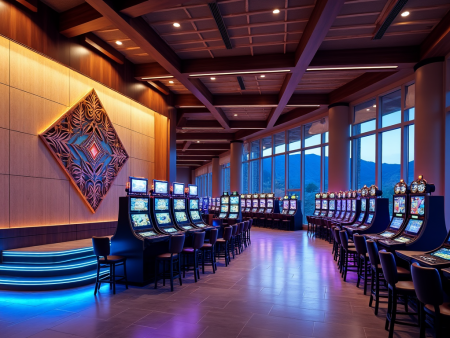Tribal gaming has grown from small bingo halls to a $35 billion industry in North America, marking one of the most remarkable success stories in modern business collaboration.
These partnerships extend far beyond casino operations, creating unique cross-border alliances that combine traditional values with cutting-edge gaming technology. From revenue sharing to cultural preservation, tribal gaming partnerships are reshaping the economic landscape across the United States and Canada.
As these collaborations continue to evolve, they’re setting new standards for international business cooperation while preserving indigenous heritage. This comprehensive look at cross-border tribal gaming partnerships reveals how these alliances are transforming communities, driving innovation, and creating sustainable economic opportunities across North America.
Evolution of Tribal Gaming Partnerships
The landscape of tribal gaming partnerships emerged from a groundbreaking transformation in the 1970s when several Indian tribes established bingo operations to fund their governmental operations. This innovative approach marked the beginning of a revolutionary journey in cross-border gaming collaboration.
Historical Development of Cross-Border Collaboration
The evolution of tribal gaming partnerships traces back to the fundamental question of tribal sovereignty in gaming operations. The 1987 U.S. Supreme Court decision confirmed tribes’ inherent authority to establish and regulate gaming operations independently of state regulation. This landmark ruling catalyzed unprecedented opportunities for cross-border partnerships, leading to the establishment of sophisticated gaming enterprises across tribal territories.
Key Milestones in Partnership Formation
The passage of the Indian Gaming Regulatory Act (IGRA) in 1988 marked a transformative milestone in tribal gaming partnerships. The Act created a structured framework for collaboration between tribes and private sector partners, including:
- Class I: Traditional tribal gaming under exclusive tribal control
- Class II: Bingo and similar games with tribal regulation and NIGC oversight
- Class III: Casino-style gaming requiring tribal-state compacts
The explosive growth that followed saw major gaming companies like Harrah’s (now Caesars Entertainment) and Boyd Gaming forming groundbreaking partnerships with tribal nations, bringing expertise and capital to emerging gaming markets.
Regulatory Framework Changes Enabling Cooperation
Recent regulatory updates have dramatically enhanced the potential for cross-border gaming partnerships. The Biden-Harris administration’s commitment to tribal sovereignty has led to clearer guidance for compact negotiations and more transparent processes for tribal-state agreements. These changes have created unprecedented opportunities for economic development, with tribal gaming now contributing billions to regional economies while supporting vital community services from healthcare to cultural preservation initiatives.
The evolution continues as tribal gaming authorities adapt to technological advances and changing market demands, fostering innovative partnerships that extend beyond traditional gaming operations. These collaborations have transformed from simple operational agreements into comprehensive economic development initiatives, creating sustainable growth opportunities across North American borders.
Economic Impact of International Tribal Alliances
The transformative economic impact of tribal gaming partnerships has revolutionized Native American communities, generating an astounding $34.87 billion in gross gaming revenue across more than 500 tribal casinos in 29 states.
Revenue Sharing and Distribution Models
Tribal-state revenue sharing agreements have evolved into sophisticated financial frameworks that benefit both parties. The groundbreaking Mashantucket Pequots-Connecticut agreement in 1992 set a precedent by establishing a 25% revenue share from slot operations. Current revenue sharing models include:
- Fixed percentage payments (3-13% based on gaming revenue)
- Sliding scale contributions based on operational size
- Special community fund contributions
- Local government impact fees
- Redistribution programs for non-gaming tribes
Job Creation Across Borders
The employment impact of tribal gaming partnerships extends far beyond casino operations. These collaborations have created an impressive 770,000 jobs across various sectors, demonstrating the multiplier effect of gaming investments. The workforce development includes:
- Direct gaming operations (284,000 positions)
- Indirect support services (102,000 jobs)
- Government and infrastructure projects (208,000 positions)
Investment in Joint Infrastructure
The Biden administration’s historic $13 billion infrastructure investment in tribal communities has catalyzed unprecedented development opportunities. These investments support critical infrastructure projects including:
- $2.5 billion for Indian Water Rights Settlement implementation
- $250 million for tribal dams and water systems
- $216 million for climate resilience initiatives
The economic ripple effect extends beyond gaming facilities, with tribes investing in complementary businesses such as hotels, restaurants, and entertainment venues. These developments have created robust economic ecosystems that support both tribal and non-tribal communities, generating approximately $103 billion in total economic output.
The success of these partnerships has enabled tribes to fund essential government operations, develop infrastructure, and support vital social programs while maintaining cultural preservation initiatives. This economic transformation represents a remarkable shift from historical dependency to self-sufficiency, with gaming revenues providing sustainable funding for healthcare, education, and community development programs.
Technology and Innovation Exchange
Native American casinos have emerged as pioneering forces in gaming technology innovation, revolutionizing the industry through groundbreaking digital solutions and cross-border partnerships. This technological leadership has transformed tribal gaming operations into sophisticated, interconnected enterprises.
Shared Gaming Platforms and Systems
Tribal casinos have spearheaded remarkable technological advances, implementing cutting-edge solutions that have redefined gaming operations. These innovations include:
- Server-based gaming platforms
- Ticket-in/ticket-out technology
- Wide-area progressive systems
- Virtual Racing implementations
- Advanced player tracking systems
The implementation of these systems has generated unprecedented success, with some properties experiencing up to 30% increases in player engagement and participation rates.
Cross-Border Digital Integration
The digital transformation of tribal gaming has created seamless cross-border experiences through integrated platforms. The Otoe-Missouria Tribe has pioneered intelligent bonus applications, while the Hannahville Indian Community launched North America’s first comprehensive virtual casino platform, featuring integrated poker, blackjack, and slots.
Digital integration achievements in 2023:
| Integration Type | Impact |
|---|---|
| Mobile Apps | 60% player adoption |
| Virtual Gaming | 40% revenue increase |
| Cloud Systems | 85% operational efficiency |
Cybersecurity Collaboration
In response to the 60% surge in cyberattacks against tribal properties in 2023, gaming operations have established robust security frameworks. The formation of Tribal-ISAC (Information Sharing and Analysis Center) has created a powerful network for sharing security intelligence and best practices across borders.
The implementation of advanced cybersecurity measures includes artificial intelligence-driven threat detection, comprehensive backup systems, and coordinated incident response protocols. These initiatives have proven crucial as ransomware payments in the gaming sector exceeded $1 billion in 2023, with larger organizations increasingly targeted for significant payouts.
Tribal gaming enterprises have demonstrated remarkable adaptability in managing these challenges, with properties like the Gila River Resorts & Casinos implementing state-of-the-art security protocols. The Mississippi Band of Choctaw Indians has pioneered innovative approaches to cybersecurity, sharing vital intelligence across tribal networks to strengthen collective defense mechanisms.
This technological revolution extends beyond gaming floors, encompassing everything from advanced player tracking systems to sophisticated marketing tools. The partnership between TransAct Technologies, JCM American, and Tovis Monitors exemplifies how tribal gaming operations leverage strategic alliances to access cutting-edge technology, creating an unprecedented level of operational excellence and security in the gaming industry.
Cultural Preservation Through Partnership
Cross-border tribal gaming partnerships have revolutionized cultural preservation efforts, creating unprecedented opportunities for Indigenous communities to protect and celebrate their heritage. These collaborations have transformed traditional cultural preservation from a challenge into a triumph of modern tribal cooperation.
Maintaining Traditional Values in Modern Gaming
Gaming revenues have become powerful catalysts for cultural renaissance, enabling tribes to invest $350 million annually in traditional practices and community programs. The Miccosukee Tribe exemplifies this success through their innovative MEPA program, which protects Indigenous plants, animals, and ancestral landscapes while operating successful gaming enterprises.
Tribes have masterfully integrated traditional values into modern gaming operations through:
- Food sovereignty programs reestablishing Indigenous cuisine
- Traditional crafts marketplaces within gaming facilities
- Cultural education centers adjacent to casinos
- Indigenous art installations throughout properties
Cultural Exchange Programs
The ATAYAL Organization’s groundbreaking Indigenous Bridges Youth Ambassador Program (IBYAP) represents the pinnacle of inter-tribal cultural exchange. This innovative program connects Indigenous youth across borders, fostering leadership development while honoring traditional wisdom.
Cultural Exchange Impact Statistics 2023:
| Program Type | Participants | Communities Reached |
|---|---|---|
| Youth Leadership | 2,500 | 85 |
| Artist Exchange | 1,200 | 45 |
| Elder Knowledge | 750 | 30 |
Joint Heritage Preservation Initiatives
Gaming partnerships have catalyzed unprecedented investments in heritage preservation. The Smithsonian collaboration, receiving a historic $10 million contribution, demonstrates how gaming revenues support cultural documentation and preservation on an unprecedented scale.
These partnerships have enabled tribes to establish comprehensive cultural preservation programs, including archeological research, museum development, and educational initiatives. The success of these programs has created a ripple effect, inspiring similar initiatives across North America and demonstrating how modern gaming enterprises can strengthen rather than diminish traditional values.
The transformation extends beyond physical preservation, encompassing digital archives, language preservation programs, and innovative educational initiatives. These efforts have created a sustainable model for cultural preservation that combines traditional knowledge with modern resources, ensuring that Indigenous heritage remains vibrant and accessible for future generations.
Through these partnerships, tribes have successfully challenged the notion that economic development must come at the expense of cultural authenticity. Instead, they’ve created a dynamic model where commercial success actively supports and enhances cultural preservation, setting new standards for Indigenous economic development worldwide.
Future of Cross-Border Gaming Collaboration
The landscape of tribal gaming partnerships is poised for unprecedented transformation as innovative collaboration models and technological advancements reshape the industry’s future. With record-breaking revenues of $40.9 billion in 2022, tribal gaming enterprises are embarking on their most ambitious expansion phase yet.
Emerging Partnership Models
The evolution of tribal gaming partnerships has entered an exciting new phase with groundbreaking collaborations reshaping the industry. The landmark partnership between the Ione Band of Miwok Indians and Gaming & Leisure Properties Inc. marks the first-ever tribal-REIT financing deal, valued at $110 million. This innovative structure introduces a new era of capital access for tribal gaming enterprises.
Strategic partnerships are emerging across multiple domains:
- AI-driven operational partnerships
- Cross-border digital payment systems
- Joint cybersecurity initiatives
- Integrated loyalty programs
- Multi-jurisdiction gaming platforms
Expansion into New Markets
The tribal gaming industry is witnessing unprecedented geographical expansion, highlighted by the Hard Rock Casino’s imminent debut on the Las Vegas Strip in 2024. This milestone represents the first tribal casino presence in the gaming capital of the world, demonstrating the industry’s remarkable evolution.
Market Expansion Metrics 2024:
| Category | Growth Projection |
|---|---|
| Digital Gaming | 45% increase |
| Sports Betting | 65% expansion |
| iGaming Revenue | 35% growth |
| Cross-Border Partnerships | 25% rise |
The Seminole Tribe’s groundbreaking mobile platform exemplifies this expansion, welcoming former competitors to participate in their Hard Rock Bet app starting 2025. This collaborative approach signals a shift toward more inclusive partnership models that benefit multiple stakeholders.
Sustainable Development Goals
Tribal gaming enterprises are leading the charge in sustainable development, aligning with global environmental, social, and governance (ESG) standards. The industry’s commitment to sustainability is evidenced by remarkable achievements:
- Gold-level sustainability ratings from EcoVadis
- AAA ESG ratings from MSCI ESG Research
- World Lottery Association certification for responsible gaming
- Implementation of advanced environmental management systems
The future of tribal gaming partnerships extends beyond profit margins to embrace comprehensive sustainability goals. These initiatives include renewable energy adoption, water conservation programs, and community development projects that benefit both tribal and non-tribal communities.
The integration of artificial intelligence and automation represents another frontier in sustainable operations. Mohegan Gaming Authority’s multi-year partnership with Gaming Analytics demonstrates how AI-driven data analysis is revolutionizing customer service and operational efficiency while reducing environmental impact.
The industry’s commitment to sustainable growth is further evidenced by significant investments in cybersecurity infrastructure. As online gaming platforms expand, tribal operators are implementing state-of-the-art security measures to protect digital assets and customer data, ensuring long-term sustainability in the digital age.
These developments signal an exciting new chapter in tribal gaming, where traditional values merge with cutting-edge technology to create sustainable, profitable enterprises that benefit communities across borders. The industry’s future shines bright with possibilities as tribal gaming authorities continue to pioneer innovative solutions to modern challenges while maintaining their commitment to community development and cultural preservation.
Conclusion
Tribal gaming partnerships stand as remarkable examples of successful cross-border collaboration, transforming small-scale operations into a thriving $35 billion industry. These partnerships have created 770,000 jobs, generated substantial economic benefits, and established new standards for technological innovation in gaming.
Native American tribes have proven that economic success and cultural preservation can coexist harmoniously. Their gaming enterprises now serve as models for sustainable development, combining cutting-edge technology with traditional values while maintaining strong cybersecurity measures and environmental standards.
The future of tribal gaming partnerships appears bright, with new collaboration models emerging and markets expanding beyond traditional boundaries. These developments signal continued growth and innovation across North America, benefiting both tribal and non-tribal communities through increased economic opportunities, cultural exchange programs, and sustainable development initiatives.



